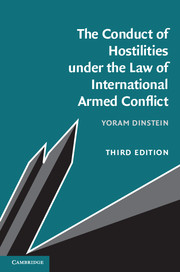Book contents
- Frontmatter
- Contents
- Introduction to the Third Edition
- Preface
- Table of cases
- Table of treaties
- List of abbreviations
- 1 The general framework
- 2 Lawful combatancy
- 3 Prohibited weapons
- 4 Lawful targets of attack
- 5 Protection from attack of civilians and civilian objects
- 6 Measures of special protection from attack
- 7 Protection of the environment
- 8 Specific methods of warfare
- 9 War crimes, orders, command responsibility and defences
- General conclusions
- Index of persons
- Index of subjects
General conclusions
Published online by Cambridge University Press: 05 April 2016
- Frontmatter
- Contents
- Introduction to the Third Edition
- Preface
- Table of cases
- Table of treaties
- List of abbreviations
- 1 The general framework
- 2 Lawful combatancy
- 3 Prohibited weapons
- 4 Lawful targets of attack
- 5 Protection from attack of civilians and civilian objects
- 6 Measures of special protection from attack
- 7 Protection of the environment
- 8 Specific methods of warfare
- 9 War crimes, orders, command responsibility and defences
- General conclusions
- Index of persons
- Index of subjects
Summary
925. Law must not be confused with liturgy. It is not enough to enact and reiterate the law: to be meaningful, norms must be adhered to in reality. The nature of LOIAC is such that Belligerent Parties tend constantly to trade mutual accusations of breaches and worse. Absent effective modalities of supervision and dispute settlement, there is no way to guarantee a thorough implementation of LOIAC in real-life violent clashes between States. No enforcement mechanisms established thus far have been crowned with outstanding success. There is a growing acknowledgement of the need to prosecute and punish war criminals for serious breaches of LOIAC, but the long-term success of the ICC is still a matter of conjecture. The issue of securing a more efficacious performance of LOIAC undertakings is not likely to fade away in the foreseeable future.
926. It is nevertheless a gross mistake to believe (as some observers do) that better implementation is the sole major item on the present agenda of LOIAC. A legal system requires clarity, on the one hand, and adaptability to changing circumstances, on the other. In theory, the broad-brush strokes of LOIAC are beyond dispute. The quintessence of LOIAC is a keen distinction between combatants and military objectives (exposed to attack) versus civilians or civilian objects (immunized from attack). The often-repeated dichotomy is not just an apodictic mantra: its preservation is the main bulwark against methods of barbarism in modern warfare. Distinction between lawful and unlawful targets – strengthened by the requirement of proportionality in collateral damage to civilians or civilian objects – and the prohibition of unnecessary suffering are elevated to the pinnacle of the law regulating the conduct of hostilities in IACs. However, as one descends from abstractions to practicalities, consensus shrinks.
927. A major problem in LOIAC today is the increasingly rampant phenomenon of direct participation of civilians in hostilities. Although it is not disputed that taking part in hostilities (for such time as it endures) triggers loss of civilian protection from attack, the contours of the concept is shrouded in controversy. This is exacerbated by the frequent comingling of combatants and civilians (‘human shields’), an issue that almost invites vitriolic disagreement. From another angle, the use of child soldiers in combat is conducive to the deterioration of civilian protection.
- Type
- Chapter
- Information
- Publisher: Cambridge University PressPrint publication year: 2016



